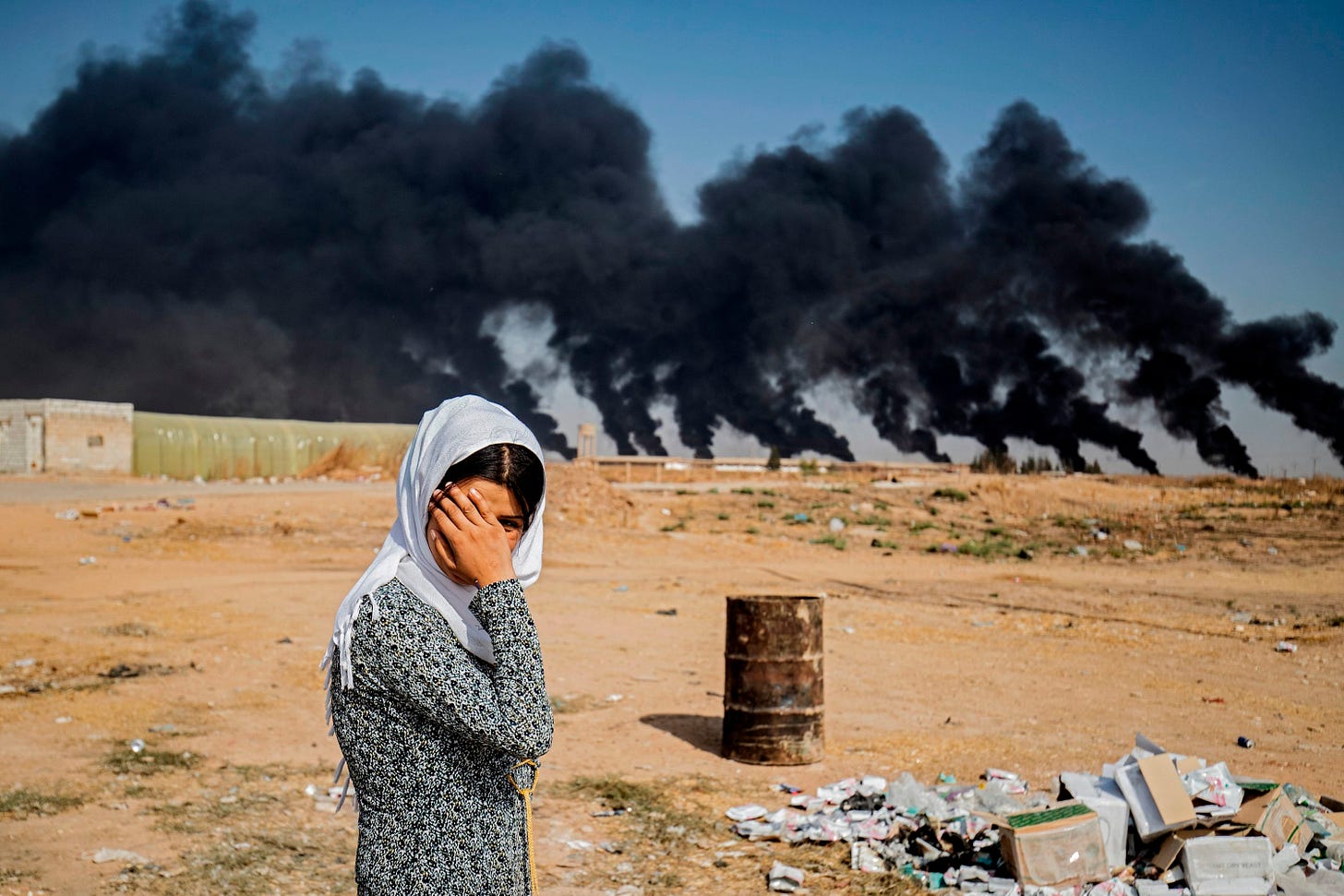Going Wobbly in Syria
Trump’s betrayal of Syria’s Kurds is unpardonable. It's also a strategic blunder that will hasten American decline.

It looks as if the opponents of American hegemony, including the American president, have conclusively had their way in the matter of Syria. One might say of President Trump’s fiasco that, to modify Churchill only slightly, the United States has sustained a total and unmitigated defeat, and the Kurds have suffered even more than we have.
It all started a fortnight ago with a phone call between Donald Trump and Turkish strongman Tayyip Erdogan. Although the details of the call are still not known, soon afterwards Trump hastily ordered the withdrawal of U.S. forces from the volatile northern edge of Syria. This immediately prompted a long-threatened Turkish invasion against the Kurds.
When an oddly similar train of events loomed before, last December, Washington erupted in fury and alarm. Members of Congress howled their disapproval, and refused to change the subject for an instant. Defense Secretary Mattis and Special Presidential Envoy McGurk swiftly resigned in protest, and Trump ultimately backed down.
By contrast, this time the world’s greatest legislative body has shown little of the deliberation for which it is famed, and the Republican leadership in particular seems to believe that discretion is the better part of valor. No resignations have been forthcoming from the invertebrate executive branch, leaving Trump relatively unscathed and his political capital (so far) undiminished.
The raison d’etre of Turkey’s offensive is to wipe out a Kurdish militia known as the People’s Protection Units. The YPG has long enjoyed good relations with the Kurdistan Workers’ Party (PKK), a separatist group that Ankara (and the U.S. State Department) consider terrorists. Nonetheless, it was the YPG that took the lead in the campaign against the Islamic State, providing the principal ground forces that undid the caliphate with the help of American airpower.
America has maintained a small contingent of soldiers in Syria for one purpose: to suppress any restoration of the caliphate. Although Turkey bitterly objected to this grant of military aid to Kurdish forces (which might have reasonably led to some measure of political autonomy for the Kurds), the United States was the unquestioned primus inter pares in the region. As long as U.S. forces remained garrisoned in northern Syria with the credible threat of military force to defend the Kurds and defeat ISIS, neither the Turkish nor the Syrian government would have dared challenge that position.
No more.
With their supply lines cut, the evacuation of U.S. forces from Syria is now a fait accompli, and this abrupt shift has already impeded the effort to combat and deter some of the most committed jihadists in the world. As the Turkish army, backed by Sunni rebels, have pressed deeper into areas controlled by Kurdish forces, Islamic State prisoners could no longer be safely held by their Kurdish captors and have scattered by the hundreds.
Scores of Kurdish fighters who have fought alongside U.S. forces, and even Kurdish civilians, have already been slaughtered by the Turkish advance, and tens of thousands more have been displaced, compelling the Kurdish authorities to appeal to the ghastly Assad dictatorship for protection. Without delay, Damascus accepted the offer and dispatched military convoys to the northern border with Turkey, reclaiming precious territory withheld from it for years without resistance.
It did not take long for the upshot of this withdrawal and capitulation to be seen by some and felt by others. With ISIS’s most ferocious Syrian foes defanged, the jihadist cause can expect to prosper with reinforcements and fresh recruits throughout the Levant. Flush with victory, the Assad regime, once so embattled and seemingly vulnerable, now stands poised to reclaim almost the entire territory of the country: an outcome explicitly called for by the Kremlin. Assad’s principal foreign patrons, Russia and Iran, have been established beyond measure as the region’s decisive powers and most reliable allies.
And just as the region’s rogues have taken heart from the deliberate power vacuum created by Trump, the region’s liberals have grown dismayed, and for the same reason: the end of Pax Americana in the Middle East. The stricken Kurds have reason to recall Bernard Lewis’s bleak but shrewd assessment that America can be harmless as an enemy, and treacherous as a friend. They will not be the only friends to feel the sting of this treachery, and the effect of enemies fighting to undermine American power and influence without much harm can only be darkly glimpsed.
All of this is nothing short of a strategic calamity that the imposition of steel tariffs will do precisely nothing to reverse. It is also a moral shame that will not soon be forgotten.


